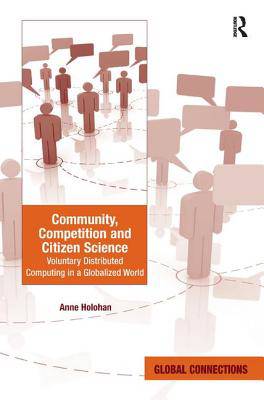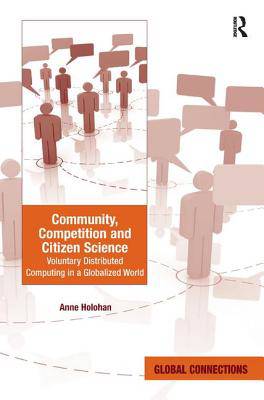
Je cadeautjes zeker op tijd in huis hebben voor de feestdagen? Kom langs in onze winkels en vind het perfecte geschenk!
- Afhalen na 1 uur in een winkel met voorraad
- Gratis thuislevering in België vanaf € 30
- Ruim aanbod met 7 miljoen producten
Je cadeautjes zeker op tijd in huis hebben voor de feestdagen? Kom langs in onze winkels en vind het perfecte geschenk!
- Afhalen na 1 uur in een winkel met voorraad
- Gratis thuislevering in België vanaf € 30
- Ruim aanbod met 7 miljoen producten
Zoeken
Community, Competition and Citizen Science
Voluntary Distributed Computing in a Globalized World. Anne Holohan
Anne Holohan
€ 85,45
+ 170 punten
Uitvoering
Omschrijving
Voluntary distributed computing projects divide large computational tasks into small pieces of data or work that are sent out over the Internet to be processed by individual users, who participate voluntarily in order to provide solutions that would ordinarily require investments of millions of dollars. This approach is contributing to the transformation of computationally heavy scientific research, opening up participation in science to interested lay people and greatly reducing the cost-barriers to computation for financially challenged researchers. Drawing on face-to-face and online ethnographic, survey and interview data with participants in distributed computing projects around the world, this book sheds light on the organizational and social structures of voluntary distributed computing projects, communities and teams, with close attention to questions of motivation in projects that offer little or no traditional forms of reward, either financially or in terms of participants' careers. With its focus on non-market, non-hierarchical cooperation, this book is a case study of networked individuals around the world who are part of a new social production of information. A rich study of the transformative potential inherent in globalization and connectedness, Community, Competition and Citizen Science will appeal to sociologists and political scientists with interests in globalization, networks and science and technology studies, together with scholars and students of media and communication and those working in relevant fields of computing, information systems and scientific collaboration.
Specificaties
Betrokkenen
- Auteur(s):
- Uitgeverij:
Inhoud
- Aantal bladzijden:
- 146
- Taal:
- Engels
- Reeks:
Eigenschappen
- Productcode (EAN):
- 9781409452980
- Verschijningsdatum:
- 6/12/2013
- Uitvoering:
- Hardcover
- Formaat:
- Genaaid
- Afmetingen:
- 156 mm x 234 mm
- Gewicht:
- 390 g

Alleen bij Standaard Boekhandel
+ 170 punten op je klantenkaart van Standaard Boekhandel
Beoordelingen
We publiceren alleen reviews die voldoen aan de voorwaarden voor reviews. Bekijk onze voorwaarden voor reviews.









